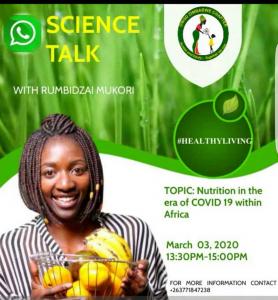Report 4 Nutrition in the era of Covid 19 within Africa
March 09, 2021
Nutrition is a critical part of health. Unhealthy diets and lack of physical activity are leading global risks to health.
Nutrition is a critical part of health. Unhealthy diets and lack of physical activity are leading global risks to health. Consuming a healthy diet throughout the life-course helps prevent malnutrition in all forms as well as a range of non-communicable diseases and conditions. The OWSD Zimbabwe National Chapter was privileged to host Miss Rumbidzai Mukori. Miss Rumbidzai Mukori is a nutritionist and health expert, health and weight management coach, author, and TV presenter. Her topic tackled the most crucial subject: “Nutrition in the era of Covid-19 within Africa”.
Nutrition continues to be an important aspect for improving overall health, despite no evidence that nutrition prevents or reduces the effects of Covid 19. The role of nutrition in supporting the immune system and maintaining proper immune function has been well documented over the years. Her presentation also clarified the definition of immunity which is the body’s ability to defend itself against infections or diseases through an innate and adaptive mechanism. According to Harvard researches, actors that affect immunity are inclusive of age, poor diet, chronic diseases, chronic mental stress, and lack of sleep and rest. These factors are relevant to health management.
Miss Mukori shared on a healthy eating plate which includes macro and micronutrients. The macronutrients are carbohydrates, protein, and fat. The micronutrients include vitamins, minerals, and water. In most parts of Africa, people suffer from malnutrition. Malnutrition is the lack of sufficient nutrients in the body. Some of the most common nutrient deficiencies in Africa include vitamin A, vitamin C, vitamin D, iron, folic acid, calcium, and iodine. Vitamin A foods include pumpkin, butternut, sweet potato, and spinach just to mention a few. Vitamin C foods include lemons, oranges, rape, covo, guava, parsley, and moringa. Vitamin D and foods include mackerel, oyster mushroom, pumpkin seeds, eggs, and sorrel herb. Iron and folic acid-rich foods include nyemba, boiled eggs, green peas, beetroot, beef liver, spinach, banana, and strawberries. Calcium foods include tomatoes, milk, soybeans, and dandelion green herbs. These foods ensure a healthy body with a robust immune system. She encouraged a healthy diet and she also shared a meal plan which comprised of a balanced diet.
In conclusion, she encouraged members to live healthy lives.












































